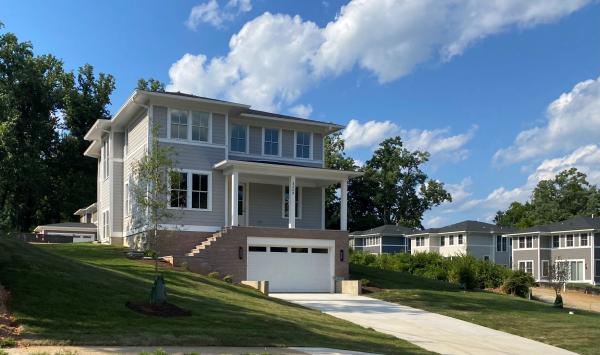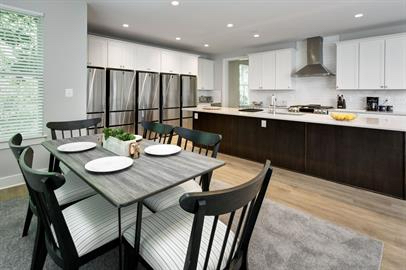The Training Page
From the Fellows Committee
Navigating Housing Challenges: Insights from NIH Trainees and an Exploration of Supportive Resources
BY STACY LIANG, NIAID

CREDIT: FAES
FAES Housing offers single-occupancy bedrooms with flexible agreement terms and affordable monthly fees that include utilities. Each unit features its own full bathroom and offers each occupant a separate pantry and refrigerator. Additional units will be available after summer 2025.
Housing, where we spend the majority of our daily lives, significantly affects both personal wellbeing and professional performance. Given that each person has unique needs and preferences, finding suitable accommodations can be a challenging and stressful task.
In June, I conducted an informal survey about the housing situation for NIH trainees. The survey received 54 responses from mostly postdocs (87%), but also research fellows (5.6%) and other trainees (7.4%). The results suggest that most trainees struggle to find affordable housing that meets their needs. Specifically, 74% disagree or strongly disagree that housing is affordable in their area, and 62% disagree or strongly disagree that it is easy to find housing that meets their needs.
Fellows who come to the NIH from other countries face significant challenges in securing housing when moving to the United States, often due to lack of a Social Security number or an American bank account. Survey respondents shared that apartments to which they applied wanted supervisors to cosign leases or required security deposits with checks only from U.S. banks. One anecdote noted a leasing office requiring proof of at least $2,000 in a savings account at a U.S. bank to rent an apartment.

CREDIT: FAES
Kitchen and dining room in the new FAES housing
To help combat the need for affordable housing for NIH trainees, the Foundation for Advanced Education in the Sciences, Inc. (FAES) has built numerous dwellings near the Bethesda campus and is renting them at a more modest rate than similarly sized and located apartments.
Located close to the NIH main campus in Bethesda, FAES Housing offers large private single-occupancy bedrooms that offers advantages over traditional rentals, including flexible agreement terms and affordable monthly fees, which include utilities, maintenance, monthly cleaning services, and basic household supplies. Each unit features individual amenities such as a separate pantry and refrigerator for each occupant and several washers and dryers in the laundry room; each unit also has its own full bathroom.
FAES Housing currently has limited availability. It accommodates 30 trainees and plans to expand with the construction of seven additional buildings by summer 2025, each offering five single-occupancy bedrooms. This expansion will create 35 more housing opportunities for NIH fellows.
Although FAES Housing has proven to be a valuable resource for NIH fellows in Bethesda, only 35.2% of my survey respondents would consider renting from FAES Housing because of varying life circumstances, such as having children, being caregivers of other dependents, or having pets.
To assist NIH fellows nationwide with their housing needs, the Office of Intramural Training and Education (OITE) provides online guidelines for each NIH U.S. location. NIEHS, in North Carolina, has an online resource for trainees moving to Research Triangle Park, for example. These guidelines compile information that fellows can use during their housing search.
As one smart survey respondent noted, “The cost of rental housing is not something that NIH can fix.” They are correct, but by leveraging these and other resources that NIH develops, and exploring options such as FAES Housing, NIH fellows can better navigate the complexities of the challenging housing market.

Stacy Liang serves as the NIH Catalyst Training Page Coordinator and is a NIAID Rocky Mountain Laboratories–Bethesda (Rocky-Beth) postdoctoral fellow. She studies lipidomics during fungal infections.
This page was last updated on Tuesday, December 3, 2024
